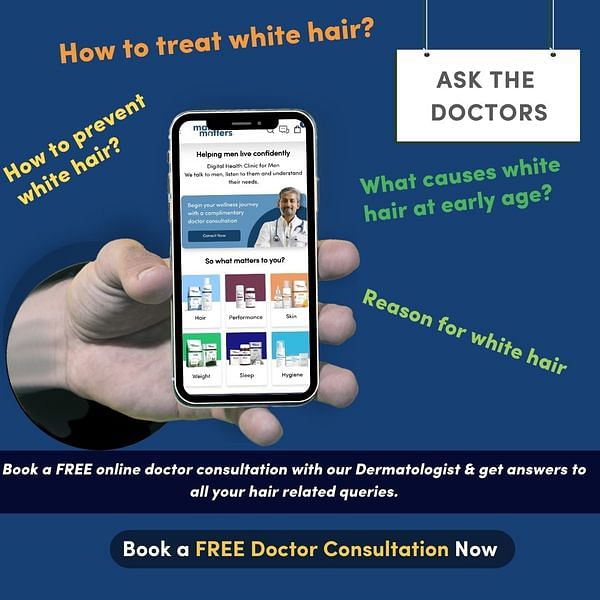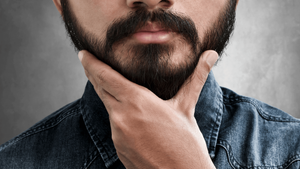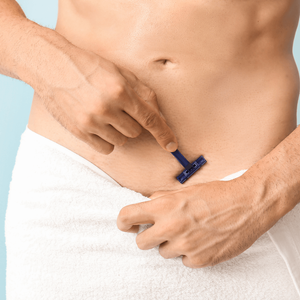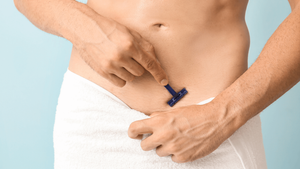White hair is a natural part of aging, but it can be a concern for many people, particularly those who experience premature graying. While genetics play a significant role in determining when and how much a person's hair turns white, there are other factors that can contribute to this phenomenon.
This article will explore the various causes of white hair, including medical conditions, nutritional deficiencies, and lifestyle factors. In addition, we will discuss some ways to prevent or slow down the graying process, from dietary changes to hair care practices.
Whether you're looking to maintain your natural hair color or simply want to understand the science behind the graying process, this article will provide valuable insights into the causes and prevention of white hair.

Reason for White Hair
There can be many causes besides age that result in a person’s hair turning white.
1. Vitamin Deficiencies
White and grey hair can appear at any age and be caused by a number of different factors. Deficiencies in vitamins B-6, B-12, biotin, D, and E can all contribute to premature greying.
Various deficiency studies on vitamin D-3, vitamin B-12, and copper and their relationship to greying hair have been conducted, according to a 2015 report published in the journal Development. It discovers that nutritional deficiencies affect pigmentation, implying that vitamin supplementation can restore colour.
A study published in the International Journal of Trichology in 2016 looked into the factors that contribute to premature greying in young Indians under the age of 25. It discovered that participants with premature hair greying had low serum ferritin levels, which store iron in the body, vitamin B-12, and the good cholesterol HDL-C.

2. Genetics
Premature greying of a person's hair is largely due to genetics, according to a 2013 report in the Indian Journal of Dermatology, Venereology, and Leprology.
Race and ethnicity are also factors. Premature greying can begin as early as 20 years old in white people, 25 years in Asians, and 30 years in African-Americans, according to the same 2013 study.
3. Oxidative Stress
While greying is mostly genetic, oxidative stress in the body may play a role when it happens too soon.
Oxidative stress occurs when antioxidants are insufficient to counteract the damaging effects of free radicals. Free radicals are unstable molecules that damage cells, contributing to ageing and disease.
Excessive oxidative stress can contribute to the development of diseases such as vitiligo, a skin pigmentation disorder. Vitiligo can also cause hair to turn white as a result of melanin cell death or cell function loss.

4. Certain Medical Conditions
Some medical conditions, such as autoimmune diseases, can increase the risk of premature greying. In fact, a 2008 study discovered a link between hair disorders and thyroid dysfunction.
White hair is associated with alopecia areata, an autoimmune skin condition that causes hair loss on the scalp, face, and other parts of the body. The hair that grows back is usually white due to a lack of melanin.
5. Real-life Stressors
It is widely assumed that stress can cause premature whitening of the hair. However, studies have not conclusively proven this.
There are conflicting research studies on real-life stressors, such as injury, that cause premature greying.
A study published in Nature Medicine by New York University discovered that when the body is stressed, the cells responsible for hair colour can be depleted.
Other studies show that, while stress may play a role, it is only one component of a larger picture that includes disease and other factors.

6. Smoking
A 2013 study published in the Italian Dermatology Online Journal found that smokers are two and a half times more likely than nonsmokers to start greying before the age of 30.
According to a 2015 study published in the Journal of the American Academy of Dermatology, smoking is linked to premature white hair in young men.
7. Chemical Hair Dyes and Hair Products
Chemical hair dyes and hair products, including shampoos, can cause premature greying. Many of these products contain harmful ingredients that inhibit the production of melanin.
Hydrogen peroxide, which is found in many hair dyes, is one such harmful chemical. Excessive bleaching of hair will eventually cause it to turn white.
What Causes White Hair at Early Age?
A variety of factors can cause white hair at a young age, including:
1. Genes
Genetics is one of the primary causes of premature greying, though the underlying causes are unknown. Your genes are to blame for either melanin-producing cell defects or a lack of melanin production at a young age.
Even at a young age, your genes may play a role in greying your hair. By chance, you could have white hair at the age of 15.

2. Diet
A poor diet can hasten the greying of one's hair. People who consume a lot of processed foods, cold drinks, salt, and sugar have a higher chance of producing free radicals in their bodies, which can cause grey hair. To keep your hair healthy and prevent grey hair, eat a healthy diet.
3. Stress
When exposed to chronic stress for an extended period, you are more likely to grey prematurely. Stress will cause your hair to grey much faster, regardless of how busy your family life is or how tired and overworked you are. The depletion of hair follicle stem cells has been linked to stress; in other words, if you are constantly stressed and resentful of yourself, you are more likely to develop white hair.
4. Vitamins and Minerals Deficiency
Follicle whitening can also be caused by an iron deficiency, a lack of folate, a lack of vitamin D, or a lack of vitamin B12. Hair greying is linked to a lack of folic acid and low biotin levels.

5. Oxidative Stress
Oxidative stress can result in white hair. When free radicals outnumber antioxidants, this happens. Antioxidants are essential for combating free radicals, but a lack of them leads to ageing and a variety of other health problems. Vitiligo is a skin condition caused by over-oxidation. Hair follicles are destroyed as a result, resulting in premature greying.
6. Hair Products Containing Chemicals
Shampoos and conditioners, which contain chemicals that inhibit melanin production, may cause premature greying of your hair. When hair dyes' bleaching agents and hydrogen peroxide ingredients are used repeatedly, the hair can turn white.
7. Smoking
Not only is smoking bad for your health, but it can also damage your hair. When you smoke, your blood vessels dilate, allowing less blood to reach your hair follicles. Cigarette smoke contains toxins that can harm hair follicles, causing grey hair to appear sooner than expected.

White Hair Treatment
1. Topical Treatments
One option for treating white hair is to use topical treatments, such as hair dyes or henna. These products can help cover up white or gray hairs and restore a more youthful appearance. However, it's important to choose a safe and effective product and follow the instructions carefully to avoid damaging your hair or scalp.
2. Nutritional Supplements
Nutritional deficiencies, such as low vitamin B12 or copper levels, can contribute to premature graying. Taking supplements or eating a nutrient-rich diet may help prevent or slow the graying process.
3. Hair Vitamins
Several hair vitamins on the market claim to improve the health and appearance of hair, including reducing the appearance of white or gray hairs. These products may contain a variety of nutrients, such as biotin, folic acid, and vitamin D.

4. Ayurvedic Remedies
Ayurvedic medicine offers a number of natural remedies for white hair, including applying a paste made from sesame oil and curry leaves or using a mixture of coconut oil and lemon juice.
5. Lifestyle Changes
Making certain lifestyle changes, such as reducing stress, getting enough sleep, and exercising regularly, may help to slow down the graying process. Stress in particular has been linked to premature graying, so finding ways to manage stress may be beneficial.
6. Hair Care Products
Using the right hair care products can also help to prevent or slow down the appearance of white hair. Look for gentle and nourishing products, and avoid those that contain harsh chemicals that can damage your hair.

7. Medical Treatments
If your white hair is caused by an underlying medical condition, treating the condition may help to restore your natural hair color. For example, thyroid problems and vitiligo can cause premature graying, and addressing these issues may help slow down or reverse the process.
8. Hair Transplant
For those who have lost a significant amount of hair due to aging, a hair transplant may be an option. This procedure involves transplanting hair follicles from one area of the scalp to another and can be an effective way to restore a more youthful appearance.
9. Laser Therapy
Some studies suggest that low-level laser therapy may help to stimulate hair growth and prevent or reverse the graying process. However, more research is needed to confirm these findings.

10. Anti Aging Treatments
Finally, there are several anti-aging treatments that may help to slow down the graying process, such as retinoids, antioxidants, and peptides. These treatments reduce oxidative stress and inflammation, both of which can contribute to premature graying. However, it's important to consult with a dermatologist before using any anti-aging products or treatments, as they may not be suitable for everyone.
Home Remedies for White Hair
Advocates of natural healing suggest a number of natural remedies for grey hair. These include
1. Indian Gooseberry And Coconut Oil
Studies suggest that Amla (Indian gooseberry) contains a high concentration of vitamin C, an antioxidant with anti-ageing properties and revitalises the pigment in your hair follicles. Coconut oil penetrates the hair shaft, reducing protein loss. This benefits hair health.
You Will Need:
- 3-5 Indian gooseberries
- 1 cup of coconut oil
Process:
- Boil 3-4 Indian gooseberries with 1 cup coconut oil to make an oil solution.
- Keep this oil in a jar and use about two tablespoons for each application.
- Massage the oil into your scalp and all the way through your hair.
- After about 15 minutes of massaging, leave the oil on for another 30 minutes. You can also leave the oil in overnight.
- Finish with conditioner after washing with a mild sulfate-free shampoo.
How Often?
2-4 times a week.

2. Black Tea
Black tea is rich in antioxidants. These antioxidants can aid in preventing free radical damage to hair and, as a result, premature greying. It also helps to darken the colour of the hair while adding shine. Black tea is also known to help with stress relief. As studies show, stress contributes to the premature greying of hair.
You Will Need:
- 2 tablespoons of black tea
- 1 cup of water
Process:
- Boil two tablespoons of black tea in a cup of water until it is thoroughly brewed.
- Allow the brew to cool.
- Apply the liquid to your hair and scalp after straining it.
- Massage your scalp for a few minutes and leave the tea in your hair for about an hour.
- Wash your hair with a gentle sulfate-free shampoo and then condition it.
How Often?
2-3 times a week.

3. Curry Leaves And Coconut Oil
Another white hair treatment people refer to is the combination of Curry leaves and Coconut Oil. Curry leaves are commonly used to retain and maintain natural hair colour and to prevent premature greying. Studies show that Coconut oil can penetrate hair follicles and nourish the hair from the root, promoting hair growth.
You Will Need:
- A handful of curry leaves
- 3 tablespoons of coconut oil
Process:
- Boil a handful of curry leaves with 3 tablespoons coconut oil to make an oil solution.
- Allow the oil to cool.
- After it has cooled, strain the oil and massage it into your scalp and through your hair.
- After about 15 minutes of massaging, leave the oil on for another 30 minutes. You could also leave the oil in overnight.
- Finish with conditioner after washing with a gentle sulfate-free shampoo.
How Often?
2-3 times a week.
4. Lemon Juice And Coconut Oil
A popular white hair solution, Lemons contain vitamin C, an antioxidant that can neutralise free radicals and protect your hair from damage. However, there is no scientific evidence that lemon juice can reverse hair greying. Studies also show that Coconut oil nourishes and stimulates hair growth.
You Will Need:
- 2 teaspoons of lemon juice
- 2 tablespoons of coconut oil
Process:
- Pour two teaspoons of lemon juice into two tablespoons of coconut oil and heat for a few seconds, until the mixture is slightly warm.
- Massage this mixture into your scalp and hair, working your way down to the tips.
- Allow it to sit for about 30 minutes.
- Wash your hair with a gentle sulfate-free shampoo and then condition it.
How Often?
2 times a week.

5. Castor Oil With Coconut Oil
Castor oil increases blood flow to the follicles. Research suggests that It contains omega-6 essential fatty acids, which help with hair health and darkening.
You Will Need:
- 1 tablespoon of castor oil
- 2 tablespoons of coconut oil
Process:
- Heat one tablespoon castor oil and two tablespoons coconut oil together for a few minutes until the mixture is slightly warm.
- Massage this oil mixture into your scalp and hair, working your way down to the tips.
- After about 15 minutes of massaging your scalp, leave it on for another 30 minutes.
- Wash your hair with a gentle sulfate-free shampoo and then condition it.
How Often?
2-3 times a week.
6. Fenugreek Seeds
Fenugreek contains B vitamins and saponins, which help to prevent hair loss. It is commonly used as a white hair problem solution. It helps maintain natural hair colour, prevent dandruff, and keep hair silky.
You Will Need:
- 2 tablespoons of fenugreek seeds
- 1/4 cup of water
Process:
- Soak two tablespoons of fenugreek seeds overnight in a quarter cup of water.
- Grind the seeds with enough water to make a smooth, consistent paste in the morning.
- Apply this mixture to your scalp and hair and leave it on for 45 minutes.
- Wash your hair with a gentle sulfate-free shampoo and then condition it.
How Often?
1-2 times a week.

7. Onion Juice And Olive Oil
According to one study, onion juice may help reduce hair loss and promote hair growth in some people. Onion juice also contains catalase, which can help reduce hydrogen peroxide buildup on your hair and scalp, reversing greying and improving hair health. The only disadvantage of using this remedy is that it is difficult to remove the onion smell from your hair. Olive oil is an emollient that moisturises and conditions your hair.
You Will Need:
- 1 medium-sized onion
- t tablespoon of olive oil
- A cheesecloth
Process:
- Chop medium onion into small pieces and combine with a tablespoon of olive oil.
- Using a cheesecloth, squeeze the juice from the pulp.
- Massage this juice into your scalp for about 10 minutes.
- Allow the juice to sit for another 30-35 minutes.
- Wash and condition your hair with a sulfate-free shampoo.
How Often?
2 times a week.
8. Henna And Coffee
Because of the presence of lawsone, henna helps cover up the appearance of white hair by adding rich reddish tones to your hair. Coffee is another popular hair colourant that can give your hair a reddish-brown to blackish-brown tinge.
Note: Ensure that you are using pure henna powder as some powders contain chemicals.
You Will Need:
5 tablespoons of henna powder
1 tablespoon of coffee
1 cup of water
Process:
- In a cup of water, brew one tablespoon of coffee.
- To avoid lumps, add five tablespoons of henna powder to the brew while stirring.
- Apply this solution to your scalp and hair and leave it on for 3-4 hours.
- Rinse thoroughly with warm water and a sulfate-free shampoo.
How Often?
Once every three weeks.

9. Sage Leaves
A go-to white hair solution, Sage leaves help to keep your hair colour and prevent greying. They can also help restore pigment to white hair patches in some cases, as studies suggest.
You Will Need:
- A handful of sage leaves
- Water
- Spray bottle
Process:
- Boil a handful of sage leaves in water until tender.
- Allow the concoction to cool before collecting the liquid in a spray bottle.
- Spritz your hair with sage tea until it is completely saturated.
- Allow the tea to steep for about 2 hours.
- Use a gentle shampoo and conditioner to remove the sage solution from your hair.
How Often?
2-3 times a week.
10. Ridge Gourd And Coconut Oil
One research found that the Ridge gourd can aid in the restoration of natural hair pigment and prevent premature greying of hair. Coconut oil penetrates and nourishes the hair shaft. It is one of the best white hair treatments available.
You Will Need:
- 1/2 cup of chopped and dried ridge gourd
- 1 cup of coconut oil
Process:
- In an airtight jar, soak half a cup of chopped and dried ridge gourd in a cup of coconut oil for 3-4 days.
- After 4 days, take about two tablespoons of the oil and warm it slightly.
- Massage the oil into your scalp and down to the ends of your hair.
- After about 15 minutes of massaging, leave the oil on your hair for another 30 minutes.
- Wash your hair with a gentle sulfate-free shampoo and then condition it.
How Often?
2-3 times a week.

11. Sesame Seed Oil And Coconut Oil
When looking for a white hair problem solution, people usually refer to this combination. Coconut oil is one of the most penetrating hair oils, and it is high in fatty acids, which help condition your hair. A commonly used white hair treatment, it promotes melanocyte activity when combined with sesame seed oil, ensuring that each strand is deeply pigmented. Studies also suggest that with regular use, sesame seed oil can also help darken the colour of your hair.
You Will Need:
- 2 tablespoons sesame seed oil
- 2 tablespoons coconut oil
- Hot towel
Process:
- Heat two tablespoons of sesame seed oil and two tablespoons of coconut oil together until the mixture is warm.
- Apply the oil to your scalp, and then run your fingers through your hair.
- After about 15 minutes of massaging, cover your hair with a hot towel and leave the oil in for another 30 minutes.
- Wash your hair with a gentle sulfate-free shampoo and then condition it.
How Often?
2-3 times a week.
12. Indian Gooseberry And Hibiscus Flower
This mask strengthens and nourishes your hair follicles, promoting scalp health and healthy hair growth. Studies found that Hibiscus prevents premature greying while also conditioning and conditioning your hair, making it more manageable.
You Will Need:
- 3 tablespoons of crushed hibiscus leaves and flowers
- 3 tablespoons of amla powder
- Water
Process:
- To make a smooth paste, combine the hibiscus paste and amla powder. Add a little water to the mixture to make the paste smooth and consistent.
- Apply the mixture to your scalp and hair, working your way down to the tips.
- Apply the mask for about 45 minutes.
- Wash your hair with a gentle sulfate-free shampoo and then condition it.
How Often?
2 times a week.

Medical Treatment for White Hair
There is no medical treatment available to reverse or prevent grey or white hair at the moment. Some medical conditions, however, can cause premature greying or hair loss and can be treated. As an example:
1. Thyroid Disorders
If your white hair is the result of a thyroid condition, treating the underlying condition can help to prevent further greying.
2. Vitiligo
Vitiligo is a condition that causes pigmentation loss in the skin and hair. Medication, phototherapy, and surgery are all options for treating vitiligo.
3. Alopecia Areata
Alopecia areata is an autoimmune disorder that results in hair loss and premature greying. Alopecia areata treatment options include medications, corticosteroid injections, and hair transplantation.
White Beard Treatment
1. Beard Dye
Beard dye is the most popular and effective treatment for white beards. There are several types of beard dyes on the market, including temporary, semi-permanent, and permanent dyes that can be applied at home. To avoid skin irritation, however, choose a product that is specifically formulated for use on facial hair.
2. Trimming
Trimming the beard can help remove white or grey hairs and make the beard look more uniform. Trimming the beard on a regular basis can also help to keep it looking neat and tidy.

3. Beard Oils and Balms
Regular use of beard oils and balms can help to nourish and maintain the health of the beard hair. These products can also help to prevent premature beard greying.
4. Medication
Certain medications, such as minoxidil, have been shown to aid in the darkening of white beard hair. However, before beginning any medication, it is critical to consult with a doctor.
5. Laser Treatment
Another option for darkening white beard hair is laser treatment. This treatment employs the use of a laser to target the hair follicles and stimulate melanin production, which can aid in the darkening of the hair. This treatment, however, is costly and requires multiple sessions to achieve the desired results.

Eyebrow White Hair Treatment
The treatment options for white eyebrow hair in men are similar to those for white hair on the scalp. Here are some possible treatments:
1. Plucking
Plucking white eyebrow hair can be a temporary solution, but it is not a permanent solution. This method can be painful and cause redness and swelling in the area.
2. Eyebrow Pencil
Using an eyebrow pencil can help fill in the eyebrows' white areas, making them appear more uniform. However, this is only a temporary solution and requires frequent touch-ups.
3. Henna
Henna is a natural dye that can be used to darken white eyebrow hair. Henna is safe and can be effective, but the color may not be as long-lasting as synthetic dyes.
4. Synthetic Dyes
Synthetic dyes can be used to color white eyebrow hair, but they can be harsh and cause skin irritation. It is important to choose a dye specifically formulated for use on eyebrows.

5. Microblading
Microblading is a semi-permanent makeup technique that involves tattooing the skin to create the appearance of fuller eyebrows. This treatment can effectively cover white eyebrow hair, but it requires maintenance and is expensive.
Before choosing a treatment option, it is important to consult with a dermatologist or a licensed esthetician to determine the best course of action for individual needs and preferences.
How to Prevent White Hair?
There are several things that men can do to delay the onset of gray or white hair:
1. A Balanced and Nutritious Diet
A diet rich in vitamins and minerals, particularly vitamin B12, can help to prevent premature graying. Foods such as leafy greens, whole grains, eggs, and lean meats are all good sources of vitamin B12.
2. Stress Management
High levels of stress can contribute to premature graying. To prevent this, men can practice stress-relieving activities such as meditation, yoga, or exercise. Deep breathing exercises can also help to reduce stress levels.

3. Avoiding Smoking and Excessive Alcohol Consumption
Both smoking and excessive alcohol consumption can accelerate the aging process, leading to premature graying of hair. Avoiding these habits can help to keep hair healthy and vibrant for longer.
4. Protection from Environmental Damage
UV radiation from the sun can damage hair, contributing to premature graying. Wearing a hat or using a scarf or umbrella in strong sunlight can help to protect hair from environmental damage.
5. Natural Hair Care Products
Using hair care products that contain natural ingredients such as amla, coconut oil, or henna can help to nourish hair and prevent premature graying. These ingredients can help to strengthen hair and prevent damage, keeping it healthy and vibrant.

Summing Up on White Hair Treatment
In conclusion, there are several treatment options available for men who want to address white hair. From using hair dyes to taking supplements, there are various methods that can help to reduce the appearance of white hair. However, it is important to remember that some of these treatments may have potential side effects or may not work for everyone. It is important to consult with a doctor or a hair care specialist to determine the underlying cause of white hair and appropriate treatment options. Additionally, maintaining a healthy lifestyle, reducing stress, and avoiding excessive use of chemicals on hair can also help to prevent premature graying.
FAQs
Does Honey Make Hair White?
No, honey does not make the hair white. In fact, honey is often used in natural hair care as a moisturizing and conditioning agent. Hair turns white due to a natural aging process where melanin production in the hair follicles decreases, resulting in a loss of pigment. No evidence suggests that applying honey to hair can reverse or slow down this process.
However, using honey in your hair care routine can provide many benefits such as improving hair texture, promoting hair growth, and reducing breakage. Honey is also a natural humectant, which means it can help retain moisture in the hair, making it a great ingredient for dry or damaged hair.
Which Vitamin Deficiency Causes White Hair?
While there is no specific vitamin deficiency that directly causes white hair, deficiencies in certain vitamins and minerals such as vitamin B12, vitamin D, copper, iron, and zinc can contribute to premature graying or accelerate the graying process by affecting the production of melanin, the pigment that gives hair its color. However, these deficiencies are not the sole cause of white hair, and the natural aging process where melanin production in hair follicles decreases remains the primary cause.
Is There Any Treatment for White Hair?
There are various options available to manage the appearance of white hair, including hair dyes, henna, and natural remedies such as amla or coconut oil. Additionally, maintaining a healthy diet, reducing stress levels, and avoiding smoking may help prevent premature hair graying. While these options may not reverse white hair completely, they can help individuals feel more confident and comfortable with their appearance.
Is It Ok to Pluck White Hair?
Yes, it is okay to pluck white hair. However, it is important to keep in mind that excessive plucking can damage the hair follicle and lead to hair thinning or even permanent hair loss. It is also important to note that plucking a single white hair will not cause more white hairs to grow in its place.
References
- Abdel Naser Zaid, July 2017; Ethnopharmacological survey of home remedies used for treatment of hair and scalp and their methods of preparation in the West Bank-Palestine - https://www.ncbi.nlm.nih.gov/pmc/articles/PMC5499037/
- Aarti S Rele, March 2003; Effect of mineral oil, sunflower oil, and coconut oil on prevention of hair damage - https://pubmed.ncbi.nlm.nih.gov/12715094/
- Andrew Steptoe, January 2007; The effects of tea on psychophysiological stress responsivity and post-stress recovery: a randomised double-blind trial - https://pubmed.ncbi.nlm.nih.gov/17013636/
- Jae Young Yu, April 2017; Preclinical and Clinical Studies Demonstrate That the Proprietary Herbal Extract DA-5512 Effectively Stimulates Hair Growth and Promotes Hair Health -
- https://www.ncbi.nlm.nih.gov/pmc/articles/PMC5429933/
Morgane De Tollenaere, 2021; Global Repigmentation Strategy of Grey Hair Follicles by Targeting Oxidative Stress and Stem Cells Protection - https://www.mdpi.com/2076-3417/11/4/1533














